构词法
- 格式:doc
- 大小:159.50 KB
- 文档页数:22
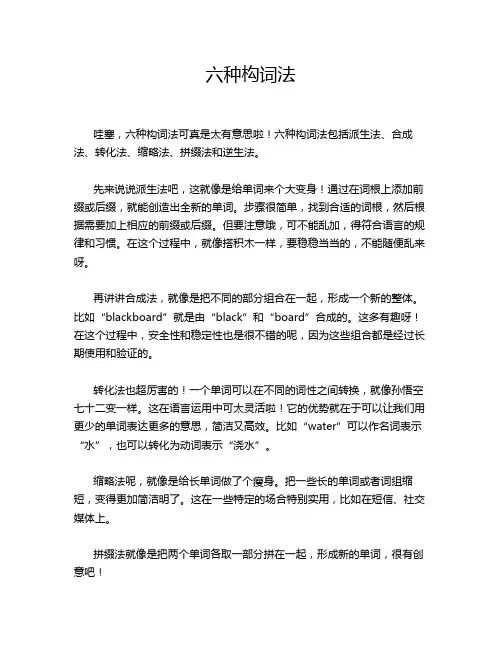
六种构词法哇塞,六种构词法可真是太有意思啦!六种构词法包括派生法、合成法、转化法、缩略法、拼缀法和逆生法。
先来说说派生法吧,这就像是给单词来个大变身!通过在词根上添加前缀或后缀,就能创造出全新的单词。
步骤很简单,找到合适的词根,然后根据需要加上相应的前缀或后缀。
但要注意哦,可不能乱加,得符合语言的规律和习惯。
在这个过程中,就像搭积木一样,要稳稳当当的,不能随便乱来呀。
再讲讲合成法,就像是把不同的部分组合在一起,形成一个新的整体。
比如“blackboard”就是由“black”和“board”合成的。
这多有趣呀!在这个过程中,安全性和稳定性也是很不错的呢,因为这些组合都是经过长期使用和验证的。
转化法也超厉害的!一个单词可以在不同的词性之间转换,就像孙悟空七十二变一样。
这在语言运用中可太灵活啦!它的优势就在于可以让我们用更少的单词表达更多的意思,简洁又高效。
比如“water”可以作名词表示“水”,也可以转化为动词表示“浇水”。
缩略法呢,就像是给长单词做了个瘦身。
把一些长的单词或者词组缩短,变得更加简洁明了。
这在一些特定的场合特别实用,比如在短信、社交媒体上。
拼缀法就像是把两个单词各取一部分拼在一起,形成新的单词,很有创意吧!逆生法是从一个已经存在的较长的单词中去掉一个看似是词缀的部分,形成一个新的较短的单词。
那这些构词法都能用在哪些地方呢?哎呀,那可太多啦!在学习英语的时候,可以帮助我们更好地理解和记忆单词;在写作中,可以让我们的表达更加丰富多样;在日常交流中,也能让我们的语言更有魅力呀!比如说,我们想表达“快速阅读”,就可以用“speed-read”,这就是合成法的应用呀,多棒!总之,六种构词法真的是太神奇啦,它们就像是语言世界里的魔法,让我们的语言变得丰富多彩、充满魅力!我们一定要好好利用它们呀!。
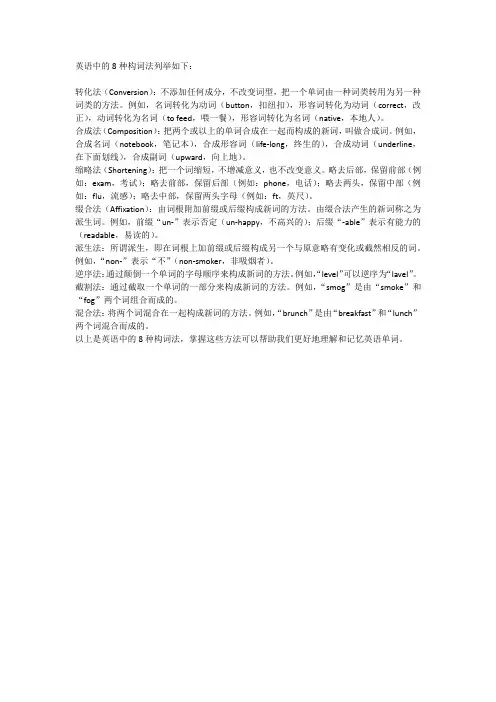
英语中的8种构词法列举如下:转化法(Conversion):不添加任何成分,不改变词型,把一个单词由一种词类转用为另一种词类的方法。
例如,名词转化为动词(button,扣纽扣),形容词转化为动词(correct,改正),动词转化为名词(to feed,喂一餐),形容词转化为名词(native,本地人)。
合成法(Composition):把两个或以上的单词合成在一起而构成的新词,叫做合成词。
例如,合成名词(notebook,笔记本),合成形容词(life-long,终生的),合成动词(underline,在下面划线),合成副词(upward,向上地)。
缩略法(Shortening):把一个词缩短,不增减意义,也不改变意义。
略去后部,保留前部(例如:exam,考试);略去前部,保留后部(例如:phone,电话);略去两头,保留中部(例如:flu,流感);略去中部,保留两头字母(例如:ft,英尺)。
缀合法(Affixation):由词根附加前缀或后缀构成新词的方法。
由缀合法产生的新词称之为派生词。
例如,前缀“un-”表示否定(un-happy,不高兴的);后缀“-able”表示有能力的(readable,易读的)。
派生法:所谓派生,即在词根上加前缀或后缀构成另一个与原意略有变化或截然相反的词。
例如,“non-”表示“不”(non-smoker,非吸烟者)。
逆序法:通过颠倒一个单词的字母顺序来构成新词的方法。
例如,“level”可以逆序为“lavel”。
截割法:通过截取一个单词的一部分来构成新词的方法。
例如,“smog”是由“smoke”和“fog”两个词组合而成的。
混合法:将两个词混合在一起构成新词的方法。
例如,“brunch”是由“breakfast”和“lunch”两个词混合而成的。
以上是英语中的8种构词法,掌握这些方法可以帮助我们更好地理解和记忆英语单词。
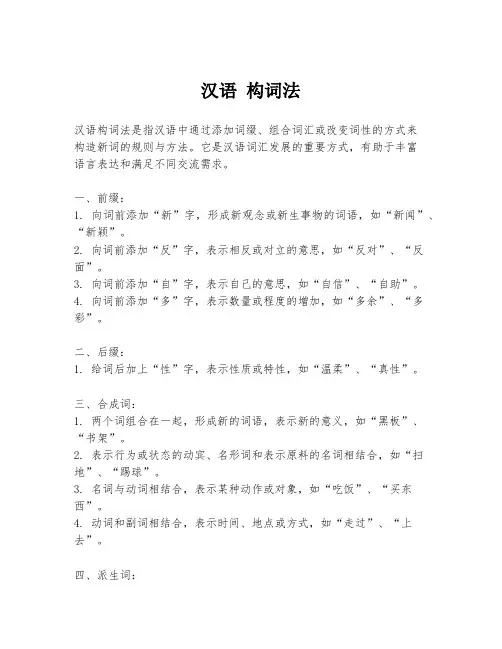
汉语构词法
汉语构词法是指汉语中通过添加词缀、组合词汇或改变词性的方式来
构造新词的规则与方法。
它是汉语词汇发展的重要方式,有助于丰富
语言表达和满足不同交流需求。
一、前缀:
1. 向词前添加“新”字,形成新观念或新生事物的词语,如“新闻”、“新颖”。
2. 向词前添加“反”字,表示相反或对立的意思,如“反对”、“反面”。
3. 向词前添加“自”字,表示自己的意思,如“自信”、“自助”。
4. 向词前添加“多”字,表示数量或程度的增加,如“多余”、“多彩”。
二、后缀:
1. 给词后加上“性”字,表示性质或特性,如“温柔”、“真性”。
三、合成词:
1. 两个词组合在一起,形成新的词语,表示新的意义,如“黑板”、“书架”。
2. 表示行为或状态的动宾、名形词和表示原料的名词相结合,如“扫地”、“踢球”。
3. 名词与动词相结合,表示某种动作或对象,如“吃饭”、“买东西”。
4. 动词和副词相结合,表示时间、地点或方式,如“走过”、“上去”。
四、派生词:
1. 在名词后加上“家”字,表示从事相关活动的人,如“教师”、“医生”。
2. 在动词后加上“者”字,表示动作的发出者,如“善行者”、“歌唱者”。
五、转化词:
1. 名词可转化为动词,表示某种动作或状态,如“打电话”、“吃饭”。
2. 动词可转化为名词,表示动作的对象或结果,如“勤工俭学”、“读书”。
以上只是汉语构词法中的一部分规则和方法,还有许多其他形式和变化。
通过运用这些构词法,我们能够创造出更多有表达力和准确性的词汇,丰富汉语的语言资源。

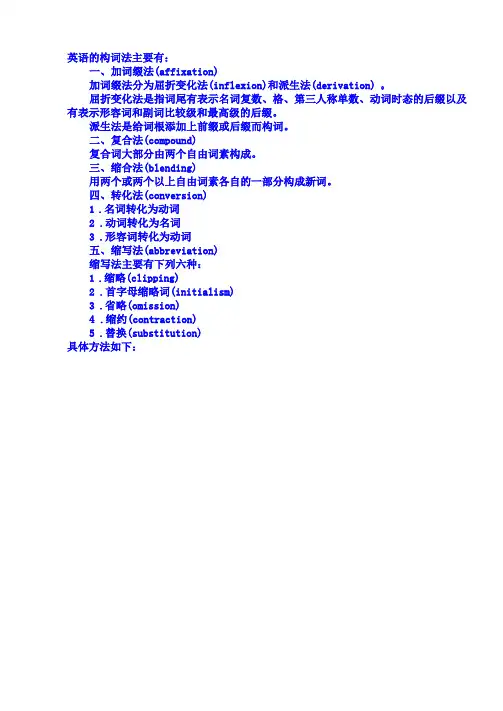
英语的构词法主要有:
一、加词缀法(affixation)
加词缀法分为屈折变化法(inflexion)和派生法(derivation) 0
屈折变化法是指词尾有表示名词复数、格、第三人称单数、动词时态的后缀以及有表示形容词和副词比较级和最高级的后缀。
派生法是给词根添加上前缀或后缀而构词。
二、复合法(compound)
复合词大部分由两个自由词素构成。
三、缩合法(blending)
用两个或两个以上自由词素各自的一部分构成新词。
四、转化法(conversion)
1.名词转化为动词
2.动词转化为名词
3.形容词转化为动词
五、缩写法(abbreviation)
缩写法主要有下列六种:
1.缩略(clipping)
2.首字母缩略词(initialism)
3.省略(omission)
4.缩约(contraction)
5.替换(substitution)
具体方法如下:。
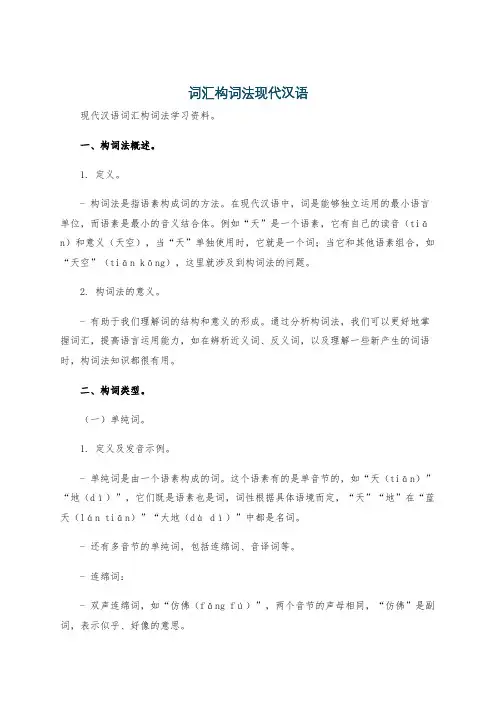
词汇构词法现代汉语现代汉语词汇构词法学习资料。
一、构词法概述。
1. 定义。
- 构词法是指语素构成词的方法。
在现代汉语中,词是能够独立运用的最小语言单位,而语素是最小的音义结合体。
例如“天”是一个语素,它有自己的读音(tiān)和意义(天空),当“天”单独使用时,它就是一个词;当它和其他语素组合,如“天空”(tiān kōng),这里就涉及到构词法的问题。
2. 构词法的意义。
- 有助于我们理解词的结构和意义的形成。
通过分析构词法,我们可以更好地掌握词汇,提高语言运用能力,如在辨析近义词、反义词,以及理解一些新产生的词语时,构词法知识都很有用。
二、构词类型。
(一)单纯词。
1. 定义及发音示例。
- 单纯词是由一个语素构成的词。
这个语素有的是单音节的,如“天(tiān)”“地(dì)”,它们既是语素也是词,词性根据具体语境而定,“天”“地”在“蓝天(lán tiān)”“大地(dà dì)”中都是名词。
- 还有多音节的单纯词,包括连绵词、音译词等。
- 连绵词:- 双声连绵词,如“仿佛(fǎng fú)”,两个音节的声母相同,“仿佛”是副词,表示似乎、好像的意思。
- 叠韵连绵词,像“朦胧(méng lóng)”,两个音节的韵母相同,“朦胧”是形容词,形容模糊不清的样子。
- 音译词:例如“咖啡(kā fēi)”,这是一个名词,是从外语音译过来的单纯词。
(二)合成词。
1. 复合式。
- 联合型(并列型)- 定义及示例:由两个意义相同、相近、相反或相关的语素并列组合而成。
例如“国家(guó jiā)”,“国”和“家”意义相近,都是名词,组合成“国家”后仍然是名词。
再如“开关(kāi guān)”,“开”和“关”意义相反,“开关”是名词,表示一种电器装置。
- 偏正型。
- 定义及示例:前一个语素修饰、限制后一个语素。
如“火车(huǒ chē)”,“火”修饰“车”,表示以火为动力的车,“火车”是名词。
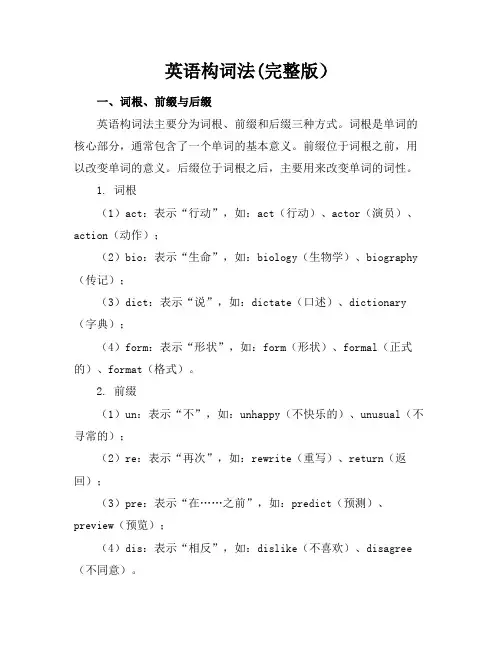
英语构词法(完整版)一、词根、前缀与后缀英语构词法主要分为词根、前缀和后缀三种方式。
词根是单词的核心部分,通常包含了一个单词的基本意义。
前缀位于词根之前,用以改变单词的意义。
后缀位于词根之后,主要用来改变单词的词性。
1. 词根(1)act:表示“行动”,如:act(行动)、actor(演员)、action(动作);(2)bio:表示“生命”,如:biology(生物学)、biography (传记);(3)dict:表示“说”,如:dictate(口述)、dictionary (字典);(4)form:表示“形状”,如:form(形状)、formal(正式的)、format(格式)。
2. 前缀(1)un:表示“不”,如:unhappy(不快乐的)、unusual(不寻常的);(2)re:表示“再次”,如:rewrite(重写)、return(返回);(3)pre:表示“在……之前”,如:predict(预测)、preview(预览);(4)dis:表示“相反”,如:dislike(不喜欢)、disagree (不同意)。
3. 后缀(1)ness:表示“状态”,如:happiness(幸福)、sadness (悲伤);(2)ful:表示“充满”,如:hopeful(充满希望的)、careful(小心翼翼的);(3)ly:表示“副词”,如:quickly(迅速地)、slowly(慢慢地);(4)tion:表示“动作、状态”,如:action(动作)、invention(发明)。
二、合成法与派生法在英语构词法中,除了词根、前缀和后缀,还有合成法和派生法两种重要的构词方式。
这些方法丰富了英语词汇,使得表达更加精确和多样。
1. 合成法(1)名词+名词:如:snowfall(降雪)、bookstore(书店);(2)名词+形容词:如:worldwide(全世界的)、citywide(全市的);(3)形容词+形容词:如:darkblue(深蓝色的)、lightgreen (浅绿色的);(4)动词+副词:如:lookup(查阅)、takeover(接管)。
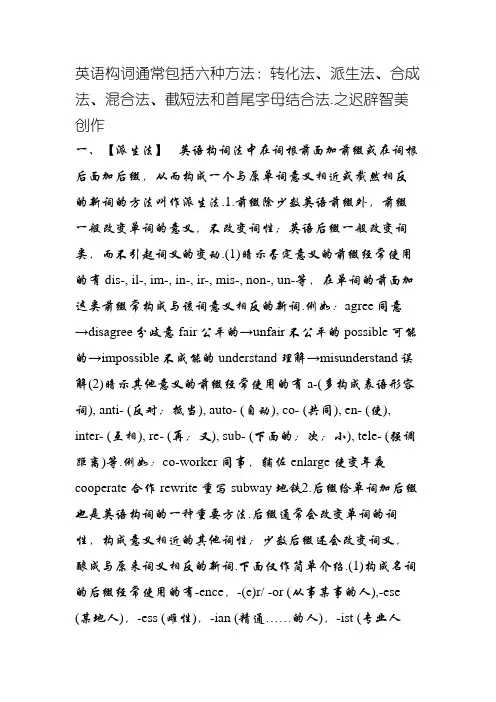
英语构词通常包括六种方法:转化法、派生法、合成法、混合法、截短法和首尾字母结合法.之迟辟智美创作一、【派生法】英语构词法中在词根前面加前缀或在词根后面加后缀,从而构成一个与原单词意义相近或截然相反的新词的方法叫作派生法.1.前缀除少数英语前缀外,前缀一般改变单词的意义,不改变词性;英语后缀一般改变词类,而不引起词义的变动.(1)暗示否定意义的前缀经常使用的有dis-, il-, im-, in-, ir-, mis-, non-, un-等,在单词的前面加这类前缀常构成与该词意义相反的新词.例如:agree同意→disagree分歧意fair公平的→unfair不公平的possible可能的→impossible不成能的understand理解→misunderstand误解(2)暗示其他意义的前缀经常使用的有a-(多构成表语形容词), anti- (反对;抵当), auto- (自动), co- (共同), en- (使), inter- (互相), re- (再;又), sub- (下面的;次;小), tele- (强调距离)等.例如:co-worker 同事,辅佐enlarge 使变年夜cooperate 合作rewrite 重写subway 地铁2.后缀给单词加后缀也是英语构词的一种重要方法.后缀通常会改变单词的词性,构成意义相近的其他词性;少数后缀还会改变词义,酿成与原来词义相反的新词.下面仅作简单介绍.(1)构成名词的后缀经常使用的有-ence,-(e)r/ -or (从事某事的人),-ese (某地人),-ess (雌性),-ian (精通……的人),-ist (专业人员),-ment (性质;状态),-ness (性质;状态),-tion(举措;过程)等.例如:differ分歧于→dif ference区别write写→writer作家China中国→Chinese中国人act饰演→actress 女演员music音乐→musician音乐家(2)构成动词的后缀经常使用的有-(e)n (多用于形容词之后),-fy (使……化),-ize (使……成为).例如:wide→widen加宽beauty→beautify美化pure→purify提纯real→realize意识到organ→organize组织sharp→sharpen使变锋利(3)构成形容词的后缀经常使用的有-al,-able (有能力的),-(a)n(某国人的),-en (多用于暗示资料的名词后),-ern (方向的),-ese(某国人的),-ful,-(ic)al,-ish,-ive,-less (暗示否定),-like (像……的),-ly,-ous,-some,-y (暗示天气)等.例如:nature自然→natural自然的reason事理→reasonable有事理的America美国→American美国的China中国→Chinese中国人的gold金子→golden金的east东→eastern西方的child孩子→childish孩子气的snow雪→snowy雪的(4)构成副词的经常使用后缀有-ly (主要用于形容词之后暗示方式或水平),-ward(s) (主要用于暗示方位的词之后暗示方向).例如:angry生气的→angrily 生气地to到→towards朝……,向……east西方→eastward 向东(5)构成数词的后缀有-teen (十几),-ty (几十),-th (构成序数词).例如:six六→sixteen十六→sixteenth第十六four四→forty四十→fortieth第四十二、【合成法】英语构词法中把两个单词连在一起合成一个新词,前一个词修饰或限定后一个词,这样的方法就是合成法.1.合成名词名词+名词weekend周末名词+动词daybreak黎明名词+动名词handwriting书法名词+及物动词+er/or pain-killer止痛药名词+介词+名词sister-in-law嫂子代词+名词she-wolf母狼动词+名词typewriter打字机动名词+名词reading-room阅览室现在分词+名词flying-fish飞鱼形容词+名词freshman年夜一新生副词+动词outlook景色,风光介词+名词afterbrain后脑2.合成形容词名词+形容词bloodred血红的名词+现在分词French-speaking 讲法语的名词+to+名词one-to-one一对一的名词+过去分词man-made人造的数词+名词one-way单行道的数词+名词+形容词three-year-old三岁的数词+名词+ed ten-storeyed十层的动词+副词one-off 一次性的形容词+名词high-quality高质量的形容词+名词+ed noble-minded高尚的形容词+形容词light-green浅绿色的形容词+现在分词ordinary-looking相貌一般的副词+形容词ever-green常青的副词+现在分词hard-working辛勤的副词+过去分词well-known著名的副词+名词fast-food专门提供快餐服务的介词+名词indoor室内的3.合成动词名词+动词sleep-walk梦游形容词+动词white-wash粉刷副词+动词overwhelm压倒,制服4.合成副词形容词+名词hotfoot慌忙地形容词+副词everywhere处处副词+副词however尽管如此介词+名词beforehand事先介词+副词forever永远5.合成代词代词宾格+self herself 她自己物主代词+self myself 我自己形容词+名词anything 一切6.合成介词副词+名词outside 在……外面介词+副词within在……之内副词+介词into进入三、【转化法】英语构词法中把一种词性用作另一种词性而词形不变的方法叫作转化法,有的名词可以作动词,有的形容词可以作副词或动词.1.动词转化为名词1)意思没有变动,例如:I think we'd better finish the talk now.我想我们的谈话最好现在结束.2)意思有一定变动,例如:He is a man of strong build.他是一个体格健壮的汉子.3)构成短语,例如:Let's have a look first. 我们先看一下吧.2.名词转化为动词1)暗示物体的,如:Have you booked the ticket?你订好票了吗?2)暗示身体部位的,如:Hand in your papers please.请把你们的试卷交上来.3)暗示一类人的,如:She nursed her husband back to health.她看护丈夫,使他恢复了健康.4)笼统名词,如:We breakfasted together.我们在一起吃了早餐.3.形容词转化为动词少数形容词可以转化为动词.例如:We will try our best to better our living conditions.我们要尽力改善我们的生活状况.4.副词转化为动词有少数副词可以转化为动词.例如:Murder will out.恶事终势必败事.5.形容词转化为名词1)暗示颜色的形容词常可转化为名词,如:The girl in black appears very beautiful.那个穿黑衣服的女孩子看上去非常漂亮.2)一些形容词如old, young, poor, rich, wounded, injured等与the连用,暗示一类人,作主语时,谓语用复数,如:We don't belong to the rich, but we dong't belong to the poor either. 我们不是有钱人,但我们也不是穷人.四、【截短法(缩略法)】将单词缩写,词义和词性坚持不变的英语构词法称为截短法,主要有截头、去尾、截头去尾等形式.1.截头telephone→phoneairplane→plane2.去尾mathematics→mathsexamination→examkilogram→kilolaborat ory→labtaxicab→taxi3.截头去尾influenza→flurefrigerator→fridgeprescription→script五、【混合法(混成法)】英语构词还可以将两个词混合或各取一部份紧缩而成一个新词,前半部份表属性,后半部份表主体.这样的英语构词法就是混合法.newsbroadcast→newscast新闻广播television broadcast→telecast 电视广播smoke and fog→smog烟雾photo andgraphy→photography摄影,摄影术helicopterairport→heliport直升飞机场六、【首尾字母缩略法】用单词首尾字母组成一个新词的英语构词法叫做首尾字母缩略法.这种形式的英语构词生成的新词,读音主要有两种形式,即各字母分别读音;作为一个单词读音.Testing of English as a ForeignLanguage→TOEFL托福Teach English as a Foreign Language→TEFLTeach English as a SecondLanguage→TESLGraduate Record Examination→GRE美国研究生入学考试1、名词: 可数(1)掌握名词复数形式的构成①直接在词尾 + s(boys, pencils)②以ch, sh, s, x结尾的 + es(watches, buses)③以“辅音字母+ y”结尾的, 变y为i + es(families, cities)④以f, fe结尾的, 变f, fe为v + es(knives, leaves)⑤不规则变动(children, women, fish, tomatoes)注意①单复数同形的名词: sheep, Chinese, Japanese.②只有复数形式的词: people, trousers, clothes, thanks.(2)掌握名词的所有格的两种暗示法①有生命的人或植物的所有格常在单词后边加's②无生命的事物的所有格用of.my mother's bag the dog's house the door of our classroom注意, 加's构成所有格时, 如果名词自己是以s结尾的则只加', 不加s.(3)不成数名词①不成数名词没有复数形式, 且前边不能用不定冠词, 也不能用数词作定语.②作主语时, 谓语动词用双数形式.③使用量词短语暗示数量.a piece of news a cup of tea2、冠词(1)掌握不定冠词a和an的用法用在第一次提到的可数名词双数前或泛指一类人或物及固定词组中.(2)掌握定冠词the的用法①用来特指某人或某物.②用在世界上唯一无二的事物的名称前.③用在序数词和形容词最高级前.④用在姓氏的复数形式前, 暗示夫妇或一家人.⑤某些词组中的固定搭配.3、代词(1)分清人称代词的主格和宾格的用法①主格在句子中作主语.②宾格在句子中作宾语.(2)分清形容性物主代词和名词性物主代词的用法①形容词性物主代词后边必需跟着它所修饰的名词.②名词性物主代词后边不能再跟名词.(3)反身代词的构成和用法反身代词在句中主要起强调作用, 词组有teach oneself, learn by oneself(4)掌握以下不定代词的基本用法①some——一些.经常使用于肯定句, 可修饰可数名词和不成数名词.any——一些, 任何.经常使用于任何否定句, 疑问句条件句中, 可修饰可数名词和不成数名词.注意与some或any组合生成的词(something, somebody, someone, anything, anybody, anyone), 其用法与some和any基秘闻同.②each——可独自使用, 强调个体, 用于两者或两者以上的每个人或物, 可作名词和形容词使用.every——不成独自使用, 强调整体, 用于三者或以上的情况, 只能作形容词用.③both, all, neither, none, either, any, the other的区别.含义对象都都不任何(一个) 每(一个) 另(一个)two both neither either each the otherthree all none any every another(5)初步掌握it用来暗示自然现象、时间、距离及作形式主语或形式宾语的用法.It's 3 o'clock in the afternoon.It's about 5 kilometres away.It's raining now.It's important to learn English well.You'll find it easy to make a kite.4、数词(1)掌握基数词和序数词的构成及基本用法.注意以下几个序数词的写法:first, second, third, fifth, eighth, ninth, twelfth, twentieth, thirty-first one hundredth(2)掌握千以内数字的写法:8, 231 eight thousand two hundred and thirty-one(3)掌握年、月、日的表达法及日常交际用语中数字的表达法:(on) August seventh, 1979; page 58; Unit25; Class Three Grade One; the No.168 Middle School(4)掌握下列词组的用法:hundreds of, thousands of, millions of, three hundred students 5、形容词和副词(1)形容词和副词的原级、比力级和最高级的构成及使用.①原级: 没有比力用原级, 特定句型用原级(as…as, not as…as, not so…as).②比力级: 两者比力用比力级, 句中有"A or B"句型或than.③最高级: 三者或三者以上比力用最高级, 句中有"A, B or C"句型或由in或of引出比力范围.④其它表达法: 比力级 + and + 比力级表“越来越……”, The + 比力级, the + 比力级表“越……越……”eg: ①Mike is tall.This room is as big as that one.This lesson isn't as interesting as lesson Three.Tom doesn't run so fast as Jack.②Which is better, this one or that one?My sister writes more carefully than my brother.③Who is the tallest, Jack, John or Tom?He is the most careful in our class.Changjiang River is the longest river in China.④Spring is coming. It's getting warmer and warmer.The barder he studied, the more knowledge he got.⑤形容词副词比力级和最高级的构成a、直接 + er / + estb、以e结尾的 + er / + estc、以辅音字母 + y结尾的变y为i + er / + estd、重读闭音节以一个辅音字母结尾的, 双写 + er / + este、不规则变动f、多音节和少数双音节的词, 在词前加more或most(2)易混的副词辨析:①already, 多用于肯定句, yet多用于否定句或疑问句中②too, also, either都暗示“也”too和also都用于肯定句中, too常放在句尾, also常放在句中, either用于否定句的句尾.6、介词(1)暗示时间的介词in, on, atin——用于较长一段时间, 星期, 月份, 季节, 年, 朝代世纪或非特指的早、午、晚等.on——具体某一天或具体某一个早、午、晚.at——在某一点时间或某个瞬间.eg: in 1988, in the 21st century, in winter, in March, in the moring, on Saturday evening, on the May seventh, on a windy night, on the afternoon, of October 31st, at eight o'clock, at night, at noon, at the end of, at this moment, at this time, at the age of (2)in与after暗示“以后”时的区别in——暗示以现在为起点的“以后”, 经常使用于将来时态中. after——经常使用于一般过去时态中, 暗示在过去某个时间之后.eg: We'll come back in two weeks.我们将在两周后回来. They came back after two weeks.两周以后, 他们回来了. (3)ago与before暗示“在……以前”时的区别ago——暗示从现在算起的“以前”, 经常是“一段时间+ ago”before——暗示以过去为起点的“以前”时, 经常是“一段时间+ before”, 如果是:”“before + 一点时间”, 则只暗示在某一点以前.eg: He went to the library 2 hours ago.He said he had gone to the library 2 hours before.They will start before eight o'clock tomorrow morning.I went to bed before nine yesterday evening.(4)for与duringfor + 一段时间常暗示“继续了一段时间”, 而during则暗示在……期间eg: He has been in Beijing for 3 years.I was in Beijing during last summer.(5)in与at暗示方位时at——与小的地址连用, 有“在某一点”的含义.in——与年夜的处所连用有“在…范围之内”的含义.He was lost at the station.The twins were born in a big city.(6)over, above与on暗示“在……上”的区别.over——指没有接触面的正上方, 反义词是under. above——指没有接触面的上方, 在高一些的位置, 反义词是below.on——指有接触面的, 在……的概况上.The plane is above the clouds.The bridge is over the river.The cup is on the table.(7)熟练掌握介词与动词、名词、形容词搭配构成的词组, 另外还要注意, 介词的后边要跟名词作它的宾语, 如果是动词, 则要酿成动名词(doing)的形式.如: She is good at singing.I'm good at English.7、连词(1)掌握连词的含义与用法and(和, 并), but(可是), or(否则, 或者), so(所以, 于是),when(当……的时候), either…or(或者……或者, 不是……就是), neither…nor(既不……也不……), so…that(如此……以致于……)8、动词(1)熟练掌握动词的现在分词, 第三人称双数, 过去式, 和过去分词的构成.注意牢记不规则动词的过去式和过去分词.(2)掌握四类动词的一般用法:①实义动词——分为及物和不及物两种, 在句中作谓语.②连系动词——be, look, feel, get, turn, become, keep等, 在句中与表语一起构成相当于谓语部份的系表结构.③助动词——帮手谓语动词构成份歧的时态和否定句, 疑问句, 不能独自使用, 也无含义.④情态动词——可以说是一种特殊的助动词, 情态动词没有人称和数的变动, 后边必需跟动词原形, 而且自己不单有含义而且可以直接构成否定句和疑问句.(3)非谓语动词的习惯用法, 一定要熟记1)begin to do sth 2)start to do sth3)decide to do sth 4)want to do sth5)(would) like to do sth 6)forget to do sth7)remember to do sth 8)love to do sth9)learn to do sth 10)need to do sth11)try to do sth 12)try not to do sth13)stop to do sth 14)ask sb.to do sth15)ask sb.not to do sth 16)like sb.to do sth17)teach sb.to do sth 18)tell sb.to do sth19)tell sb.to do sth 20)want sb.to do sth21)help sb.(to) do sth 22)let sb.do sth23)have sb.do sth 24)make sb.do sth25)had better do sth 26)had better not do sth27)feel / hear sb.do sth 28)watch / see sb.do sth29)why not do sth 30)be busy doing sth31)see / watch sb doing sth 32)feel / hear sb doing sth 33)enjoy doing sth 34)finish doing sth35)keep (sb) doing sth 36)go on doing sth37)stop doing sth 38)like doing sth39)begin doing sth 40)start doing sth41)prevent sb from doing 42)stop sb / sth from doing sth43)spend时间 / 金钱(in) doing sth 44)It takes sb. some time to do sth.45)It is good (wrong, easy, difficult, important…) to do sth46)It is time (for sb.) to do sth 47)be used for doing sth48)will / would you please do sth 49)what about (doing) sth (4)能够区别使用下列动词1)tell, say, speak, talk2)bring, take, carry3)lend, borrow, keep4)listen, listen to, hear, hear from, hear of5)look, look at, see, watch, notice6)reach, arrive(in / at), get to7)look for, look after, look at, look up8)put on, put up, put down, put away, put into9)look for, find, find out, found10)take off, take away, take down11)try on , put on, wear, dress, get dressed12)ask for, send for13)get back, give back, take back14)be made in, be made of, be made from, be made by15)get on, got off, get into, get out of16)get in, get up, get on…with17)go down, go on, go out18)look out, look out of19)turn on, turn off, turn up, turn down, turn to, turn over20)send out, sent to , send away, send up, send for21)fill…with… be full of… be filled with…23)be in, be out, be away, be over, be up24)wear out, sell out25)worry about the worried about26)cost, pay, spend, take(5)注意延续性动词(段动词)与瞬间动词(点动词)在用法上的区别.瞬间动词有: join, buy, come, go, leave, arrive, begin, start, open, closed, become, borrow, lend, die, get等.记住: 瞬间动词(点动词)不能与暗示继续一段时间的时间状语连用.。
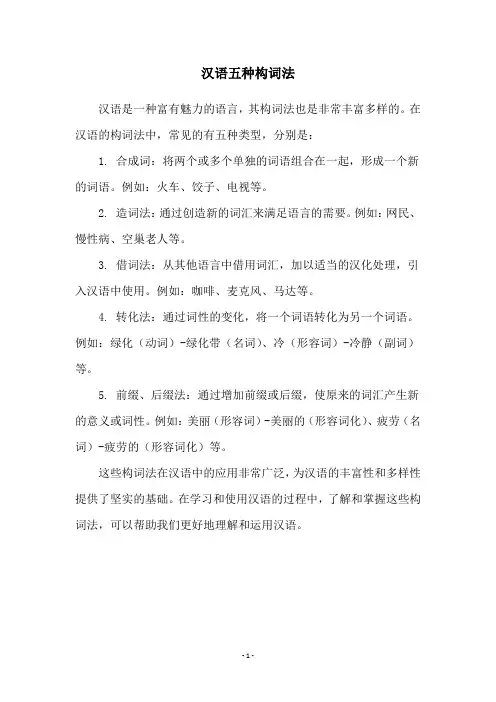
汉语五种构词法
汉语是一种富有魅力的语言,其构词法也是非常丰富多样的。
在汉语的构词法中,常见的有五种类型,分别是:
1. 合成词:将两个或多个单独的词语组合在一起,形成一个新的词语。
例如:火车、饺子、电视等。
2. 造词法:通过创造新的词汇来满足语言的需要。
例如:网民、慢性病、空巢老人等。
3. 借词法:从其他语言中借用词汇,加以适当的汉化处理,引入汉语中使用。
例如:咖啡、麦克风、马达等。
4. 转化法:通过词性的变化,将一个词语转化为另一个词语。
例如:绿化(动词)-绿化带(名词)、冷(形容词)-冷静(副词)等。
5. 前缀、后缀法:通过增加前缀或后缀,使原来的词汇产生新的意义或词性。
例如:美丽(形容词)-美丽的(形容词化)、疲劳(名词)-疲劳的(形容词化)等。
这些构词法在汉语中的应用非常广泛,为汉语的丰富性和多样性提供了坚实的基础。
在学习和使用汉语的过程中,了解和掌握这些构词法,可以帮助我们更好地理解和运用汉语。
- 1 -。
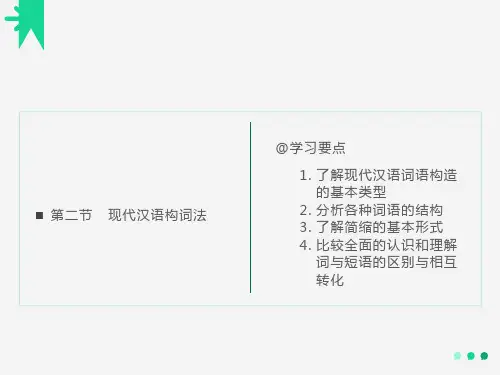
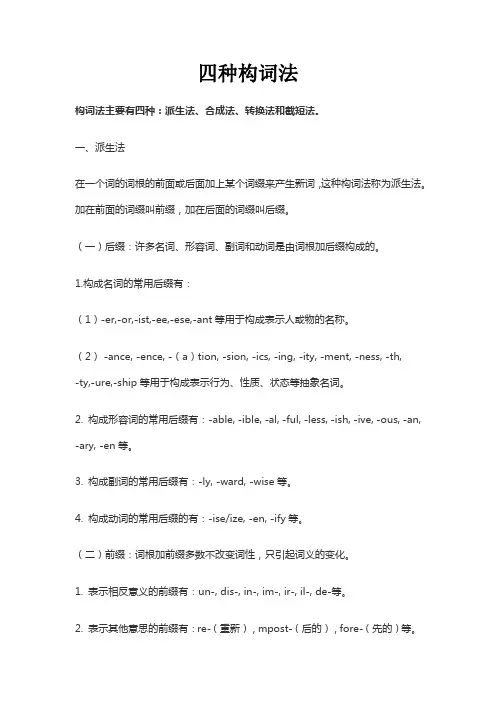
四种构词法构词法主要有四种:派生法、合成法、转换法和截短法。
一、派生法在一个词的词根的前面或后面加上某个词缀来产生新词,这种构词法称为派生法。
加在前面的词缀叫前缀,加在后面的词缀叫后缀。
(一)后缀:许多名词、形容词、副词和动词是由词根加后缀构成的。
1.构成名词的常用后缀有:(1)-er,-or,-ist,-ee,-ese,-ant等用于构成表示人或物的名称。
(2) -ance, -ence, -(a)tion, -sion, -ics, -ing, -ity, -ment, -ness, -th,-ty,-ure,-ship等用于构成表示行为、性质、状态等抽象名词。
2. 构成形容词的常用后缀有:-able, -ible, -al, -ful, -less, -ish, -ive, -ous, -an, -ary, -en等。
3. 构成副词的常用后缀有:-ly, -ward, -wise等。
4. 构成动词的常用后缀的有:-ise/ize, -en, -ify等。
(二)前缀:词根加前缀多数不改变词性,只引起词义的变化。
1. 表示相反意义的前缀有:un-, dis-, in-, im-, ir-, il-, de-等。
2. 表示其他意思的前缀有:re-(重新),mpost-(后的),fore-(先的)等。
二、合成法由两个或两个以上的词合成一个新词,这种构词法称为合成法(compounding)。
合成词之间有的要用连字符连接,有的直接连接在一起。
三、转换法在词行不变的情况下,一个单词由一种词性转换成另一种词性,称为转换(conversion)。
转换后的词义与转换前的词义通常有密切的联系,但有时差异也很大。
有些双音节的词转换后,重音要发生变化。
通常名词重音在前,动词重音在后,有时读音也有不同。
四、截短法即将单词缩写,词义和词性保持不变,主要有截头、去尾、截头去尾等形式。
关于合成法:合成名词:构成方式例词名词+名词weekend周末;名词+动词daybreak黎明;名词+动名词handwriting书法;名词+及物动词+er/or pain-killer止痛药;名词+介词+名词editor-in-chief总编辑;代词+名词she-wolf母狼;动词+名词typewriter打字机。
英语四个构词法(最新版)目录1.英语构词法的概述2.英语构词法的分类3.构词法的具体用法和例子4.学习构词法的重要性5.总结正文英语四个构词法英语构词法指的是英语单词是如何通过不同的方式组成新单词的。
英语单词的构成方式有很多种,但最常见的构词法主要包括以下四种:前缀法、后缀法、词根法和复合法。
1.前缀法前缀法指的是在单词前面加上一个前缀来构成新单词。
前缀可以是单词、字母或者符号,它们通常用于改变单词的意思。
例如,单词“happy”(快乐) 加上前缀“un”(不),就可以构成新单词“unhappy”(不快乐)。
2.后缀法后缀法指的是在单词后面加上一个后缀来构成新单词。
后缀也可以是单词、字母或者符号,它们通常用于改变单词的词性。
例如,单词“happy”(快乐) 加上后缀“-ness”(名词后缀),就可以构成新单词“happiness”(快乐)。
3.词根法词根法指的是通过将单词分解成词根来构成新单词。
词根是单词的基本部分,通常是一个或多个字母。
例如,单词“correct”(正确) 可以分解成词根“cor”(共同) 和“rect”(直),然后通过加上后缀“-ly”(副词后缀) 来构成新单词“correctly”(正确地)。
4.复合法复合法指的是将两个或多个单词组合在一起来构成新单词。
例如,单词“book”(书) 和“shop”(商店) 可以组合在一起构成新单词“bookshop”(书店)。
学习构词法对于学习英语非常重要。
它可以帮助我们更好地理解单词的意思和用法,并且可以帮助我们更容易地记住单词。
通过学习构词法,我们可以更好地掌握英语单词,提高我们的英语水平。
英语中的构词法英语中的构词法主要用于将词语进一步细分功能逻辑单元,以表达新的含义。
构词法主要有:词根构词法、派生构词法、缩略构词法、拼音构词法、兼用构词法、拉丁构词法、外来构词法、合成构词法、组词构词法、单字构词法等十种构词法。
1. 词根构词法:在词根构词法中,一个单词可能由几个词根组成,比如“trustworthy”,即信任+可靠,来表达可靠的含义。
2.派生构词法:这种构词法了: 就是利用主词派生出其它单词; 比如,“dark”和“darkness”,“book”和“bookshop”3.缩略构词法:比如,“GDP”,即“Gross Domestic Product(国内生产总值)”的缩写。
4.拼音构词法:拼音构词法涉及将汉语拼音转换成英语单词,比如“fan”(风扇)。
5.兼用构词法:这是一种将不同语言的单词拼合在一起,去表达出一个新的专有词语的构词方式。
比如“Coca-Cola”就是一个比较出名的兼用词语。
6.拉丁构词法:拉丁构词法将拉丁文单词(例如拉丁文的后缀)编织在英语词汇中,以提高英文的表达能力; 比如time-consuming,即“浪费时间的”。
7.外来构词法:外来构词法就是将外来词语翻译成英语或灵活改写; 比如烧烤“barbecue”,源于法语“barbicue”。
8.合成构词法:合成构词法指的就是把两个单词拼合起来形成新的词语,以展示新的概念的构词方式。
比如selective(审慎的),是select(选择)+ive(形容词后缀)合成而成。
9.组词构词法:组词构词法由熟语短语转换成一个单词; 比如“skyrocket”,可以表达“冲天而起”的含义,就是组成sky和rocket而形成的新词语。
10.单字构词法:这种构词方式是通过单个字母作为单词构成部分; 比如“a”, “I”,“am”等,都可以构成单独的意思,但它们又不能形成一个熟语短语。
英语八大构词法英语八大构词法又称为八大组块法,是指英语中最常用的八种构词方式。
它们分别为:复合,介词-形容词,動名詞,副詞,省略,変化,动词,单词片断组合法。
一、复合(Compounding):把两个或以上的词结合起来组成一个新的词。
比如:blackboard(黑板),pickpocket(扒手)。
二、介词-形容词(Prepositional-Adjective):在英语中,介词和形容词不可分割,构成一个新的词。
比如:over-excited(过度激动),out-of-date(过时的)。
三、動名詞(Verbal Nouns):由动词的不定式、分词或动词加上-ing形式构成。
比如:睡眠时,sleeping(睡);写作时,writing(写)。
四、副詞(Adverbs):由名词、形容词、动词及其派生词构成,也包括量詞、助词等。
比如:sometime(某个时候),hereafter(今后),someway(以某种方法)。
五、省略(Ellipsis):省略某部分,但仍可以理解。
比如:ad (广告),bus(公共汽车),doc(医生)。
六、変化(Inflections):在词尾变化,形成新的词,常用词尾有:-s, -ed, -ing等。
比如:speak(说话)-speaks(说),walk (走)-walking(走)。
七、动词(Verbs):动词构成方式大都是复合、介词-形容词等,也可以直接改变动词的时态等变化而成新词。
比如:buy(买)-bought(买),drink(喝)-drank(喝)。
八、单词片断组合法(Word-Fragment Combination):把构成单词的片断组合起来,构成短语或新词。
比如:break(折断)+through(通过)=breakthrough(突破)。
英语八大构词法是一种有效的英语学习方法,使用者能够更全面、更系统的了解和掌握单词的构成方式和意思,从而更好地提高学习英语的效率。
构词法中的构词规则构词法,又被称为词形变化学,是研究词的构成和形态变化规律的一门学科。
在语言中,通过构词法可以了解词汇的构成方式,了解单词的来源和词义的变化。
构词规则是构词法中的重要内容,它指导着词语的形成和发展。
在本文中,我们将介绍一些常见的构词规则。
一、前缀和后缀构词规则1.前缀构词规则前缀是附加在词根前面的一个或多个字母或音节,用以改变词的词义或词类。
常见的前缀有:un-、dis-、re-、mis-等。
例如:- unhappy:un-表示否定,意为不快乐的;- dislike:dis-表示否定,意为不喜欢;- rebuild:re-表示重新,意为重建;- misunderstand:mis-表示错误,意为误解。
2.后缀构词规则后缀是附加在词根后面的一个或多个字母或音节,用以改变词的词义或词类。
常见的后缀有:-able、-ful、-ness、-er等。
例如:- comfortable:-able表示能够,意为舒适的;- hopeful:-ful表示充满,意为充满希望的;- happiness:-ness表示状态,意为幸福;- teacher:-er表示职业,意为教师。
二、合成构词规则合成构词是指通过两个或多个独立的词根组合形成新的词语。
合成构词常用于形容词、名词和动词的构成。
例如:- blackboard:black和board组合而成,意为黑板;- football:foot和ball组合而成,意为足球;- brainstorm:brain和storm组合而成,意为头脑风暴。
三、转化构词规则转化构词是指通过改变词的词类而形成新的词语,常见的转化构词包括名词转动词、形容词转名词等。
例如:- email(n.):名词email可以转化为动词email,意为发送电子邮件;- friend(n.):名词friend可以转化为形容词friend,意为友好的。
四、派生构词规则派生构词是指通过在词根或词素中添加前缀、后缀或其他词素的手段,生成新的词语。
七种构词法及例子一、前缀构词法:前缀构词法是指通过在词根前面加上一个前缀来构成新的词语。
下面是七个例子:1. 重新:表示重新做某事。
例如:重新开始、重新设计。
2. 非:表示否定或相反的意思。
例如:非法、非凡。
3. 反:表示相反的意思。
例如:反对、反弹。
4. 同:表示相同或一起的意思。
例如:同学、同步。
5. 超:表示超过的意思。
例如:超市、超速。
6. 多:表示多个的意思。
例如:多功能、多余。
7. 不:表示否定的意思。
例如:不同、不幸。
二、后缀构词法:后缀构词法是指通过在词根后面加上一个后缀来构成新的词语。
下面是七个例子:1. 化:表示使变成某种状态。
例如:化妆、变化。
2. 人:表示某种身份或职业。
例如:警察、医生。
3. 性:表示某种性质或特征。
例如:性格、个性。
4. 主义:表示某种思想或信仰。
例如:社会主义、共产主义。
5. 区:表示某个地区或范围。
例如:城区、禁区。
6. 家:表示某个家庭或机构。
例如:家庭、公司。
7. 学:表示某种学科或学习的意思。
例如:数学、学习。
三、合成构词法:合成构词法是指通过将两个或多个词根结合在一起形成新的词语。
下面是七个例子:1. 电脑:由“电”和“脑”两个词根组成,表示一种用电做计算的机器。
2. 高速:由“高”和“速”两个词根组成,表示速度很快的意思。
3. 机器人:由“机器”和“人”两个词根组成,表示一种能够模仿人类行为的机器。
4. 电话:由“电”和“话”两个词根组成,表示通过电线传递声音的通信工具。
5. 自行车:由“自行”和“车”两个词根组成,表示人力驱动的两轮交通工具。
6. 火车:由“火”和“车”两个词根组成,表示以蒸汽或电力为动力的铁路交通工具。
7. 地球:由“地”和“球”两个词根组成,表示地球这个星球。
四、转化构词法:转化构词法是指通过改变词性或词类的方式构成新的词语。
下面是七个例子:1. 打:从动词转化为名词,表示击打的动作或声音。
例如:一打、拳打脚踢。
2. 红:从形容词转化为名词,表示红色。
五种构词法一、联合型1、外在形式:名+名、动+动、形+形联合型的词,外在形式上都是两个表事物、动作或者性状的字,例如“途径”中的“途”和“径”都表示事物,“开关”中的“开”和“关”都表示动作,“寒冷”中的“寒”和“冷”都表示性状。
2、内在逻辑:并列联合型的词,内在逻辑上,两个字之间是并列关系,无主次之分。
语义上,两个字意义意义相同、相近、相关、或相反。
例如“途径”中的“途”和“径”并列,意义相同,都表示“路”,“开关”中的“开”和“关”并列,意义相反,“寒冷”中的“寒”和“冷”并列,意义相关。
二、偏正型1、外在形式:定语+名词状语+动词或形容词偏正型分为定中和状中两种,定中型偏正的外在表现形式为“定语+名词”,也就是其第二个字必定是表示事物的,如“冰箱”;状中型偏正的外在表现形式为“状语+动词或形容词”,也就是其第二个字必定是表示动作或性状的。
如“游击”“火红”。
综上,一个合成词,其第二个字是表示事物、动作或者性状的,其有可能是偏正关系,具体还需要看两个字间的逻辑关系。
2、内在逻辑:修饰限制偏正型的词,内在逻辑上,两个字之间是修饰、限制关系,即第一个字修饰、限制第二个字。
例如“冰箱”,“冰”修饰“箱”,冰的箱;“游击”,“游”修饰“击”,游动地打击;“火红”,“火”修饰“火”,像火一样的红。
三、补充型1、外在形式:动+补语名+量补充型分为动补和量补两种,补充型词的动补外在表现形式为“动+补语”,也就是其第一个字必定是表示动作的,如“推翻”;补充型词的量补外在表现形式为“名+量”,也就是其第一个字表示事物,第二个字是表示该事物的量词,如“书本”。
2、内在逻辑:补充补充型的词,内在逻辑上,两个字之间是补充关系,即第二个字补充说明第一个字。
例如“推翻”,“翻”补充说明“推”,推得怎么样,推翻,类似的还有“提高、改进”等;而量补是较为特殊的,第二个字是第一个字的量词,例如“书本”“马匹”“房间”等。
四、动宾型1、外在形式:动+名动宾型词的外在表现形式为“动+名”,也就是其第一个字必定是表示动作的,第二个字是表示事物的,如“管家”“失业”。
第七章:构词法(初稿)英语单词的构成有一定的规律,这种规律被称为构词法。
在此需要说明的是,有许多英语单词是不符合构词的规律的。
但是掌握了基本的英语构词法后,就能分析那些符合一定规律而构成的单词,进而有助于记忆这些单词。
单词学得越多,碰到的符合规律的例子就越多,运用构词法也就越来越熟练,这样就可以不断减轻记单词的负担,单词也就记得更牢更多更快了。
例如,internationalize由前缀inter-(……之间)+词根nation(国家)+形容词后缀-al(的)+动词后缀-ize(使……化),故它是动词―使国际化‖之意。
由此可以看出,英语构词知识有助于识别单词词性,也有助于猜测单词的意义,所以,它有助于记忆单词。
又如floccinaucinihilipification(藐视心理)中共有27个字母,死记它确实不易,而且即使记住了也容易忘记,可用构词法知识帮助记忆:floc-ci-nau(词根)-ci-ni-hi-lip-if-ic-ation。
英语常见构词法有三种:合成、转化和派生。
7.1 合成词(复合词compound)是由两个或更多的词合成一个词。
一般说来容易记住。
例如,classroom教室,blackboard黑板,moonlight月光,everyone每个人。
还有些合成词只需要略动一点脑筋来记。
例如,well+come(来得好)—welcome欢迎all+together(所有的都在一起)—altogether总共flash+light(闪光的灯)——flashlight闪光灯、手电筒bed+room(放床的房间)——bedroom卧/寝室school+leaver(离开学校的人)——school-leaver学校毕业生合成词主要有以下几类:7.1.1合成名词:lifeboat(救生艇),dining-room(餐厅),woodcutter(伐木工),firefighter (消防队员),gentleman(绅士),Englishman (英国人),bedclothes(床上用品),raincoat (雨衣),homeland (祖国),saleswoman(女售货员),comrade-in-arms(战友)。
7.1.2 合成形容词:good-looking(样子好看的),world-famous(闻名于世的),full-time (全日制的),man-made(人造的)warm-hearted(热心肠的),cold-blooded(冷血的),money-making(能赚钱的),short-wave(短波的),everyday(每天的)。
7.1.3合成动词:overthrow(推翻),whitewash(粉刷),overturn(倾覆、推翻),overuse(把……过度使用),dumbfound(使目瞪口呆),outbreak(爆发),overtake(超过/赶上),sightsee(观光/游览),overvalue(把……估计/定价过高)。
7.1.4 合成副词:however(然而),wherever(无论何地、无论在什么地方),whenever (无论何时),maybe(或许),whoever(无论谁),somewhere(某处)。
7.1.5合成代词:none, themselves, everyone, anything, nothing, another, nobody, something, everything。
7.2 转化(conversion):英语中,有的名词可作动词,有的形容词可作副词或动词,这种把一种词性用作另一种词性而词形不变的方法叫做转化法。
7.2.1 动词转化为名词1)很多动词可以转化为名词,大多数情况下,意思没有多大的变化Let's go out for a walk.我们到外面去散散步吧。
2)有时意思有一定变化He is a man of strong build.他是一个体格健壮的汉子。
3)有的与一个动词和不定冠词构成短语,表示一个动作,如:Let's have a swim.咱们游泳吧。
7.2.2 名词转化为动词1)很多表示物件Did you book a seat on the plane? 你订好飞机座位了吗?2)身体部位Please hand me the book.请把那本书递给我。
3)某类人的名词可以用作动词来表示动作She nursed her husband back to health.她看护丈夫,使他恢复了健康。
4)某些抽象名词也可作动词We lunched together.我们在一起吃了午餐。
7.2.3 形容词转化为动词We will try our best to better our living conditions.我们要尽力改善我们的生活状况。
7.2.4 副词转化为动词Murder will out.(谚语)恶事终必将败露。
7.2.5 形容词转化为名词1)表示颜色的形容词常可转化为名词You should be dressed in black at the funeral.你在葬礼中该穿黑色衣服2)某些形容词如old, young, poor, rich, wounded, injured等与the连用,表示一类人,作主语时,谓语用复数如下The old in our village are living a happy life.我们村的老年人过着幸福的生活。
empty (adj.空的)——empty(v.倒空)back(n.背部/后面)——back(adj.后面的,adv.在后面,vt.支持,vi.后退)increase(n.[‗inkri :s]录音、纪录)——increase(vt.[in‘kri :s]记录、记载、录音)。
当然,也有个别单词在进行词类转变时,词形稍有变化,读音也有变化。
如:advice[ Əd‘vais ](n.劝告)——advise[Ə d‘vaiz](vt.忠告、劝告)bath[ba:ϴ ](n.洗澡)——bathe[bei Ϡ](洗澡,泡)。
7.3 派生(derivation):通过在词根上加前缀或后缀构成新词。
这时,词义多少要起点变化。
如n. care关心,n & v.留心、关心、介意,adj. careful仔细的,careless粗心的、马虎的,adv. carefully仔细地,carelessly粗心地、马虎地,n. carefulness仔细,carelessness粗心、马虎。
有时,从某一个词根派生出不同的单词,而它们的意义虽有相同的一面,但也有完全不同的一面。
如engine n. 引擎、发动机,engineer n.工程师,v.设计/操纵,engineering n. 工程学,enginery n.机器类/武器,以上几个词的意义虽然有所不同,但都与机器有着直接或间接的关系。
下面我们先谈谈前缀(prefix)。
7.3.1 前缀(prefix):英语单词的前缀都具有一定意义,加前缀后一般不改变词性。
掌握常见或实用前缀的意义,对记忆派生词很有益处。
常见的前缀主要有以下28种:1.a-(1)a-+n.构成adv.相当于in(在…里):abed(在床上);on、at在…上,在…:atop (在顶上),ashore(在岸上),ashore(在海滨),ahead(在头上)。
(2)a-+v.—adv.或adj.表示―在……状态/过程中‖,asleep(睡着的),alive(活着的),awake(醒着的),alone(单独的、独自的)。
以a-开头的adj.常用作表语或宾补,有时也可作后置定语。
如:1)We must keep it alive.2) She was alone/asleep.3) He is a man alive.2.ab-从…(from);不abnormal(不正常的),abstract(抽象的),absorb(吸引/吸收),about(在…周围)3.ad-向,到(to)advance(前进),admit(承认),address(地址),admire(钦佩),adventure(冒险),advice(建议)4.anti-反对,反,抗(against)antibody(抗体),anti-gas(防毒气的),antifreeze(防冻剂),antitank(防坦克的),anti-Japan(抗日),antimissile(反导弹的),anticlockwise(反时钟方向的),anti-imperialism (反帝),antibiotic(抗菌的,抗菌素)5.auto-自动,自己(self)automatic(自动的),autobiography(自传),automobile(汽车),autograph(亲笔签名)。
6.be-在…旁边(by)beside(在…旁边),before(在…以前),because(因为),belong(属于)7.com-,con-和、共、合(with)compound(化合物,复合词),common(普通的),commune(公社),communism (共产主义),conference(大会),conclude(断定),connect(连接、相通)8.dis-不,无(1)加在v.前,表示―…否定,相对,相反‖(not)disagree(不同意),dislike(不喜欢),disbelieve(不相信),distrust(不信任),disappear(消失),discourage(使泄气),discover(发现)(2)加在以v. g. s. f开头的词或词根前,则分别变为di-,de-,dif-,表示―…脱、离(from/apart)‖,―不(not)‖之义divorce(使离婚),digress(离开本题),difference(不同、分歧、差异),difficulty (困难),diffract(分解),desulphurize(脱硫)(3)加在adj.或p.p. (过去分词)前,表示―不,无(not)‖dishonest(不诚实的),disappointed(失望的),discouraged(泄气的,气馁的),disloyal(不忠实的),different(不同的),disabled(残疾的)(4)加在n.前(构成n.),表示―不(not)‖discomfort(不舒适),disagreement(不同意、不一致),disappointment(失望),distrust(不信任),disloyalty(不忠实),discovery(发现)9.en-.(1)使成为,使有(make…have)加在n.,adj.前构成v.encourage(鼓励),enslave(奴役),encircle(包围),enlarge(扩大),enrich (使富有,丰富),enable(使能够),enjoy(喜欢)(2)en-在以字母b, p, m, ph开头的v.或n.前变成em-emphasis(强调),emphasize(强调),empower(使有力量),embarrass(使为难、使难堪),employ(雇佣)(3)后加n.或v.,构成v., 表示―置于…之中/上(put…in/on…)‖endanger(使处于危险之中),emplane(登机),embed(嵌入),embrace(拥抱)(4)enemy是由en-(不是)+拉丁词根ami(朋友)构成的——不是朋友(即敌人,与friend相对)10.ex-出(out)export(出口),expression(表情、表达),extend(延伸),extract(提取、拔出)11.extra-额外的,特别的(special, extra)extraordinary(非凡的,奇特的),extravagant(奢侈浪费的,过分的),extracurricular (课外的)12.in-(1)入,内(后加n.,v.或adj. V ., 相当于in或into)income(收入),inside(在里面),indoors(在室内),include(包括),inland(内陆的)(2)in-有时可写成en-,inclose——enclose(把…封入,包在里面,随信寄来)(3)in-加在adj.前表示否定―不,非(not)‖incorrect(不正确的),indirect(间接的),incomplete(不彻底的),invisible(看不见的)(4)in-加在以n, l, m或p, r开头的词(常为adj.)前时分别变成ig-, il-, im-, ir-ignoble(不高尚的),illegal(非法的),illogical(不合逻辑的),imperfect(不完善的),impolite(不礼貌的),immortal(不朽的),immoral(不道德的),irregular (不规则的),irresponsible(不负责的);例外词:unreasonable(不合理的)13.inter-相互,互相,…之间(加在adj. n. v.前)international(国际的),interflow(交流),intercontinental(洲际的),interchange (互换),interchangeable(可相互交换的)14.mis-误,错,不良,恶,坏(wrong, bad, not),常加在v.前,有时也加在n.前misconduct(错做,行为不轨),mistrust(不信任,怀疑),mislead(领错路),misunderstanding(误解、误会),mischief(恶作剧),mistake(错误),mistaken(弄错的),misfortune(不幸),miscalculate(算错),mischance(不幸、灾难)15.non-非,不,无(not),常常加在adj.或n.前non-stop(不停地),non-smoker(不吸烟者),non-white(非白种人),non-English-speaking(不讲英语的),non-identical(不同的,非同一般的), nonsense废话。